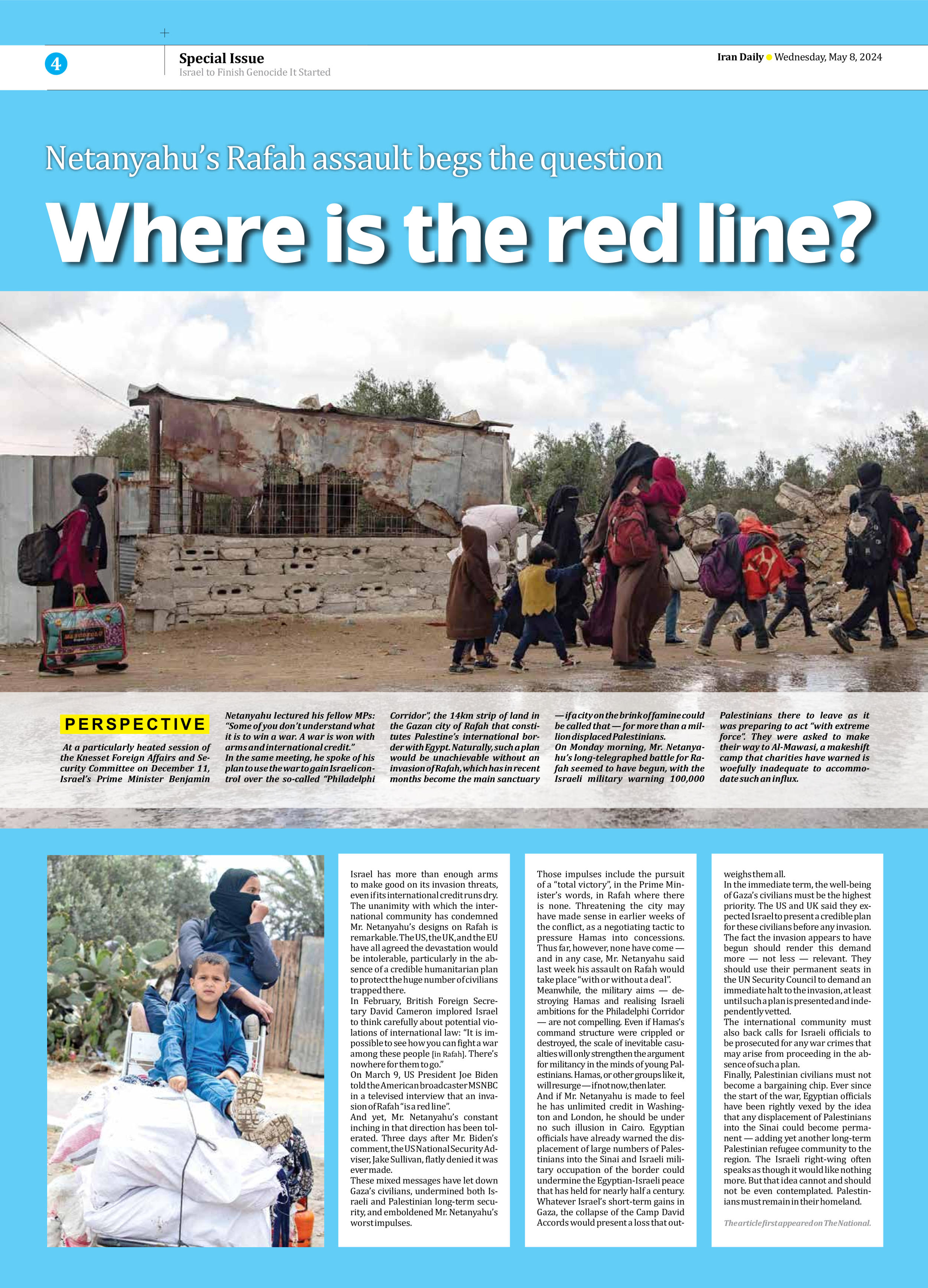
Netanyahu’s Rafah assault begs the question
Where is the red line?
At a particularly heated session of the Knesset Foreign Affairs and Security Committee on December 11, Israel’s Prime Minister Benjamin Netanyahu lectured his fellow MPs: “Some of you don’t understand what it is to win a war. A war is won with arms and international credit.” In the same meeting, he spoke of his plan to use the war to gain Israeli control over the so-called “Philadelphi Corridor”, the 14km strip of land in the Gazan city of Rafah that constitutes Palestine’s international border with Egypt. Naturally, such a plan would be unachievable without an invasion of Rafah, which has in recent months become the main sanctuary — if a city on the brink of famine could be called that — for more than a million displaced Palestinians. On Monday morning, Mr. Netanyahu’s long-telegraphed battle for Rafah seemed to have begun, with the Israeli military warning 100,000 Palestinians there to leave as it was preparing to act “with extreme force”. They were asked to make their way to Al-Mawasi, a makeshift camp that charities have warned is woefully inadequate to accommodate such an influx.
Israel has more than enough arms to make good on its invasion threats, even if its international credit runs dry. The unanimity with which the international community has condemned Mr. Netanyahu’s designs on Rafah is remarkable. The US, the UK, and the EU have all agreed the devastation would be intolerable, particularly in the absence of a credible humanitarian plan to protect the huge number of civilians trapped there.
In February, British Foreign Secretary David Cameron implored Israel to think carefully about potential violations of international law: “It is impossible to see how you can fight a war among these people [in Rafah]. There’s nowhere for them to go.”
On March 9, US President Joe Biden told the American broadcaster MSNBC in a televised interview that an invasion of Rafah “is a red line”.
And yet, Mr. Netanyahu’s constant inching in that direction has been tolerated. Three days after Mr. Biden’s comment, the US National Security Adviser, Jake Sullivan, flatly denied it was ever made.
These mixed messages have let down Gaza’s civilians, undermined both Israeli and Palestinian long-term security, and emboldened Mr. Netanyahu’s worst impulses.
Those impulses include the pursuit of a “total victory”, in the Prime Minister’s words, in Rafah where there is none. Threatening the city may have made sense in earlier weeks of the conflict, as a negotiating tactic to pressure Hamas into concessions. Thus far, however, none have come — and in any case, Mr. Netanyahu said last week his assault on Rafah would take place “with or without a deal”.
Meanwhile, the military aims — destroying Hamas and realising Israeli ambitions for the Philadelphi Corridor — are not compelling. Even if Hamas’s command structure were crippled or destroyed, the scale of inevitable casualties will only strengthen the argument for militancy in the minds of young Palestinians. Hamas, or other groups like it, will resurge — if not now, then later.
And if Mr. Netanyahu is made to feel he has unlimited credit in Washington and London, he should be under no such illusion in Cairo. Egyptian officials have already warned the displacement of large numbers of Palestinians into the Sinai and Israeli military occupation of the border could undermine the Egyptian-Israeli peace that has held for nearly half a century. Whatever Israel’s short-term gains in Gaza, the collapse of the Camp David Accords would present a loss that outweighs them all.
In the immediate term, the well-being of Gaza’s civilians must be the highest priority. The US and UK said they expected Israel to present a credible plan for these civilians before any invasion. The fact the invasion appears to have begun should render this demand more — not less — relevant. They should use their permanent seats in the UN Security Council to demand an immediate halt to the invasion, at least until such a plan is presented and independently vetted.
The international community must also back calls for Israeli officials to be prosecuted for any war crimes that may arise from proceeding in the absence of such a plan.
Finally, Palestinian civilians must not become a bargaining chip. Ever since the start of the war, Egyptian officials have been rightly vexed by the idea that any displacement of Palestinians into the Sinai could become permanent — adding yet another long-term Palestinian refugee community to the region. The Israeli right-wing often speaks as though it would like nothing more. But that idea cannot and should not be even contemplated. Palestinians must remain in their homeland.
The article first appeared on The National.







